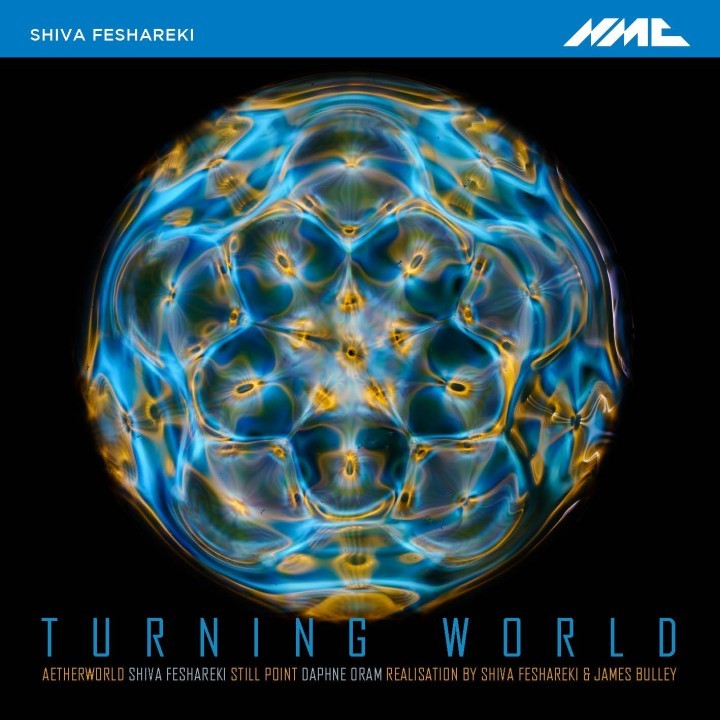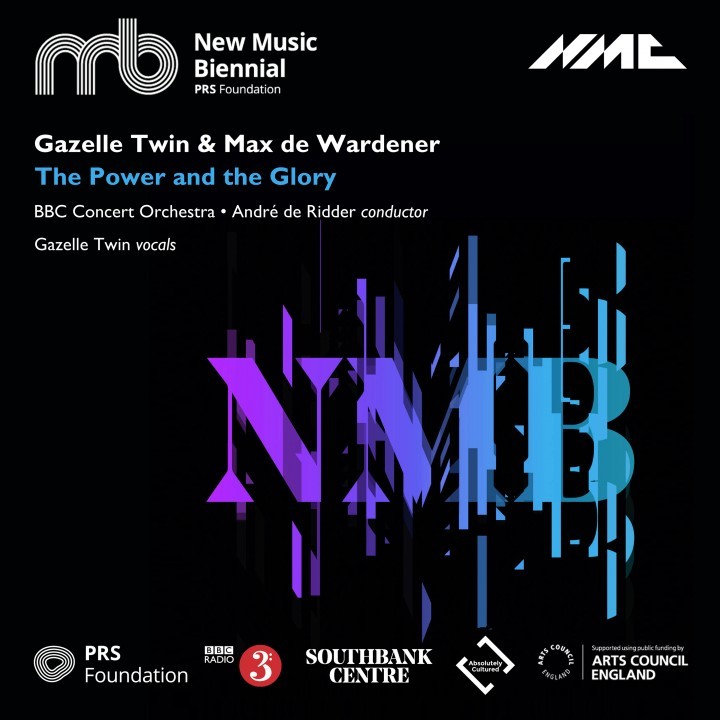NMC Guest Playlist 8: Marcus du Sautoy
3rd May 2023
Playlists NMC RecordingsMathematician, broadcaster, and author Marcus du Sautoy is Professor of Mathematics at the University of Oxford and the Simonyi Professor for the Public Understanding of Science. Together with composer Emily Howard, he co-founded PRiSM, the Centre for Practice & Research in Science & Music at the Royal Northern College of Music, which creates collaborative opportunities for mathematicians, scientists and musicians. Marcus plays trumpet and violin and is passionate about all sorts of music. This is reflected in his eclectic maths and science-inspired playlist. Find out more about Marcus's selections below.
Marcus wrote the liner notes for Emily Howard's recent release on NMC - you can read them in the PDF booklet downloadable (for free) from the NMC shop.
1. Robert Schumann - Piano Quartet in E-flat major, Op.47,
What I’m listening to a lot at the moment is the Schumann Piano Quartet Op 47. A few years ago I started learning the cello and to push myself I formed a string quartet called the Firsby Quartet after the road I live on. We lost our first violin who moved to Hong Kong so the trio decided to invite a pianist into the mix. Our first venture is with the Schumann so I am currently immersing myself in different recordings.
2. Johann Sebastian Bach: Goldberg Variations arr. Dmitry Sitkovetsky
Before we’d found our pianist we’d been playing the amazing arrangement by Sitkovetsky of the Goldberg Variations for string trio. It’s probably sacrilege to say but I actually prefer this arrangement to the original. You get to hear all the different lines so clearly.
3. Johann Sebastian Bach: Six Keyboard Partitas - Charles Owen (piano)
I’ve worked with a number of pianists over the years presenting my thoughts on the mathematics behind the Goldberg Variations including an amazing performance I did with Charles Owen at the London Piano Festival. He hasn’t recorded the Goldberg (yet) but I have enjoyed his recording of Bach’s Six Keyboard Partitas.
4. Maurice Ravel: String Quartet in F-major - Quatuor Ébène
Before our violinist left for Hong Kong we’d been indulging in a some of the great string quartets in the repertoire but I think the Ravel String Quartet in F-major was my favourite. Very challenging though.
5. Emily Howard: sphere - BBC National Orchestra of Wales, Mark Wigglesworth (conductor)
I’m really excited by the NMC release of Emily Howard’s Torus, the recordings of her pieces inspired by mathematical geometries (for which I’ve contributed a sleeve note). My work with Emily at PRiSM at the RNCM also led to the composition of new string quartet, Four Musical Proofs and a Conjecture. This piece explores my belief that mathematical proof and musical composition share a lot in common.
6. Franz Schubert: String Quartet No.14 in D-Minor, D.810 "Death and the Maiden" - Amadeus Quartet
One of the ingredients that Emily used in the composition of her string quartet was another of the wonderful string quartets that our Firsby Quartet have tackled: Schubert’s Death and the Maiden. One of the proofs I love in mathematics is the power to transform one mathematical idea into something completely different. For example Fermat proved how to transform every prime numbers which has remainder 1 on division by 4 (for example 41) into two square numbers added together (for example 41=16+25). Emily took up the challenge to get from one of Beethoven’s quartets to the second movement of the Schubert. It mirrors amazingly the feeling of mathematical transformation in Fermat’s proof.
7. Iannis Xenakis: Nomos Alpha - Arne Deforce (cello)
I have been obsessed for some time with Nomos Alpha, a piece for solo cello by Iannis Xenakis. Last year was Xenakis’ 100th anniversary which gave me the opportunity with PRiSM to realise a dream I’ve had for some time to create an animation to explain the amazing mathematics of the symmetry of a cube behind the composition. I ended up performing this animation as a duet with the cello at a number of festivals last year.
8. Olivier Messiaen: Quatuor pour la fin du temps 1. Liturgie de Crystal
The animation was created in collaboration with the amazing artist Simon Russell. We’d worked together before on an exciting animation which explores the mathematics behind Liturgie de Crystal, the first movement of Oliver Messiaen’s incredible piece Quartet for the End of Time.
9. Johann Sebastian Bach: English Suite No.1 in A-major II. Allemande - Murray Perahia (piano)
One of the themes that we have been exploring at PRiSM is the impact that AI is having on musical composition. One of our first ventures was training an AI on Bach’s keyboard works and then giving it one of Bach’s English Suites (which it hadn’t encountered) with sections removed and asking it to fill in the gaps. Mahan Esfahani performed the piece at the Barbican as part of a triptych that I created celebrating the 40th anniversary of the publication of Hofstadter’s book Gödel Escher Bach. We asked the audience to try to identify the sections created by AI. They found it impossible but interestingly Mahan said they were easy for him as a player to identify because they were impossible to play. AI doesn’t care about fingering. Bach did!
10. Robert Laidlow: Silicon - BBC Philharmonic, Vimbayi Kaziboni (conductor)
Rob Laidlow who worked on the Bach-AI project has gone on to explore the powerful way that AI can almost be a new instrument for a composer to write for culminating in his impressive piece Silicon premiered with the BBC Philharmonic in October 2022.
11. György Ligeti: Hungarian Rock - Mahan Esfahani (piano)
Mahan and I have known each other for many years since meeting at New College. One of his most memorable performances that I attended was his Ligetti at the Wigmore Hall which we are lucky to have captured on disc.
12. James Holden: Common Land
I’ve done a number of exciting ventures with the Barbican in addition to the project we did on Gödel Escher Bach. The performance I did about Consciousness culminated in an exciting new composition by James Holden. It was our attempt to use music to heighten the consciousness of the audience. I’ve continued to follow James’s career including his most recent album Imagine This is a High Dimensional Space of All Possibilities. How could I resist a title like that!
13. Floating Points: Someone Close
I have a regular gig that I do at Glastonbury Festival in the Theatre and Circus area, a kind of high-wire mathematical acrobatics. But it gives me the chance to explore new music. Floating Points caught my eye, partly because the name refers to a mathematical idea. If I’d come for the mathematics, I stayed for the music. Check out their recent release Someone Close.
14. Gazelle Twin: The Power and the Glory - BBC Concert Orchestra, André de Ridder (conductor)
My other source of new music is the wonderful Late Junction on Radio 3 and it’s there that I’ve discovered a number of artists who have recorded work with NMC including Gazelle Twin.
15. Shiva Feshareki: Still Point - Daphne Oram, James Bulley (live orchestra mix/electronics), Shiva Feshareki (turntables), London Contemporary Orchestra, Robert Ames (conductor)
Another brilliant Late Junction discovery.
16. Nakul Krishnamurthy: Anudhatthamudhatthassvaritham
During lockdown I wrote a new play called The Axiom of Choice. It is an exploration of free will through the story of one of my mathematical heroes, Andre Weil. The play has a strong Indian narrative related to the Bhagavad Gita. I staged the play last year and spent some time exploring interesting soundscapes which might fuse mathematics and India. I ended up working with a great composer Florian Bel but on my way I enjoyed listening to Nakul-Krishnamurthy’s Tesserae which I discovered via my wonderful local performance space Café Oto. We are hoping to take The Axiom of Choice on tour in the near future.
17. Harpreet: Ye Jo Pal Hai (Raw)
I go to India a lot and on my recent trip to Jaipur I got to hear the wonderful singer and guitarist Harpreet. His performance of Nanak Singh’s poem Khooni Vaisakhi is truly haunting especially when you understand that it is about the Jallianwala Bagh massacre that happened on 13 April 1919. There is a wonderful translation of the poem into English by his grandson Navdeep Suri.
18. John Cage: Music of Changes, Book 1 - David Tudor (piano)
I have a new book out in Autumn 2023 called Around the World in 80 Games. I’ve had fun in one part of the sections exploring the use of dice and other ideas of randomness to create aleatoric music. So my final piece for my playlist is John Cage’s Music of Changes which uses the i-Ching to make random choices in the composition.
NMC's Guest Playlist series features a broad range of curators who we invite to share their all-time favourite music. With selectors ranging from musicians to artists to presenters to critics and beyond, you can always be sure of an interesting and eclectic mix.
Check out Guest Playlist 5: Rakhi Singh
Check out Guest Playlist 6: Jessica Curry
Check out Guest Playlist 7: Nicky Spence
NMC's Discover platform is created in partnership with ISM Trust.


